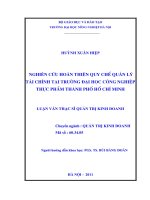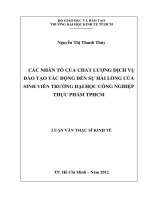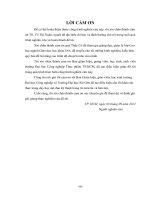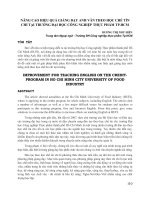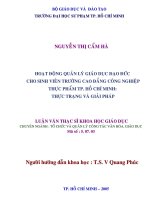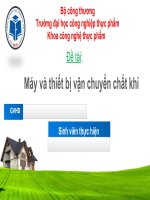Vocabulary English every living works - Trường Đại học Công nghiệp Thực phẩm Tp. Hồ Chí Minh
Bạn đang xem bản rút gọn của tài liệu. Xem và tải ngay bản đầy đủ của tài liệu tại đây (401.71 KB, 20 trang )
<span class='text_page_counter'>(1)</span><div class='page_container' data-page=1></div>
<span class='text_page_counter'>(2)</span><div class='page_container' data-page=2>
in context
<b>VOCABULARY</b>
in context
◆ <b>Health and Safety</b> ◆ <b>Responsible Citizenship</b>
◆ <b>Car and Driver</b> ◆ <b>Nutrition and Cooking</b>
<b>VOCABULARY</b>
<b>EVERYDAY LIVING</b>
<b>WORDS</b>
</div>
<span class='text_page_counter'>(3)</span><div class='page_container' data-page=3>
Development and Production: Laurel Associates, Inc.
Cover Design: Elisa Ligon
Interior Illustrations: Katherine Urrutia, Debra A. LaPalm, C. S. Arts
Copyright © 2002 by Saddleback Educational Publishing. All rights reserved.
No part of this book may be reproduced in any form or by any means, electronic
or mechanical, including photocopying, recording, or by any information storage
and retrieval system, without the written permission of the publisher.
ISBN 1-56254-392-X
Printed in the United States of America
07 06 05 04 03 9 8 7 6 5 4 3 2 1
Three Watson
Irvine, CA 92618-2767
E-Mail:
Website: www.sdlback.com
E
VERYDAY
L
IVING
W
ORDS
H
ISTORY
AND
G
EOGRAPHY
W
ORDS
M
EDIA
AND
M
ARKETPLACE
W
ORDS
M
USIC
, A
RT
,
AND
L
ITERATURE
W
ORDS
S
CIENCE
AND
T
ECHNOLOGY
W
ORDS
W
ORKPLACE
AND
C
AREER
W
ORDS
</div>
<span class='text_page_counter'>(4)</span><div class='page_container' data-page=4>
<b>CONTENTS</b>
▼
<b>Introduction</b>
...
4UNIT 1
<b>Preview</b> ... 5<b>LESSON</b>
<b>1</b>
Glossary ... 6<b>2</b>
Are You “Test-Wise”? ... 9<b>3</b>
Beware of TelephoneScams ... 12
<b>4</b>
Keep Your Cool! ... 15<b>5</b>
Controlling Pests ... 18<b>6</b>
A Car’s SafetyFeatures ... 21
<b>7</b>
Vocabulary Stretch ... 24▼ <b>Unit 1 Review</b> ... 27
UNIT 2
<b>Preview</b> ... 30<b>LESSON</b>
<b>1</b>
Glossary ... 31<b>2</b>
Computers andHealth ... 34
<b>3</b>
Easy Biscuits ... 37<b>4</b>
Will You Lenda Hand? ... 40
<b>5</b>
A Gardening Project ... 43<b>6</b>
Good Mental Health ... 46<b>7</b>
Vocabulary Stretch ... 49▼ <b>Unit 2 Review</b> ... 52
UNIT 3
<b>Preview</b> ... 55<b>LESSON</b>
<b>1</b>
Glossary ... 56<b>2</b>
Buying Life Insurance ... 59<b>3</b>
Megavitamins:A Good Idea? ... 62
<b>4</b>
Understanding MassMailings ... 65
<b>5</b>
Practicing Conservation ... 68<b>6</b>
Washing Your Car ... 71<b>7</b>
Vocabulary Stretch ... 74▼ <b>Unit 3 Review</b> ... 77
UNIT 4
<b>Preview</b> ... 80<b>LESSON</b>
<b>1</b>
Glossary ... 81<b>2</b>
Reading Food Labels ... 84<b>3</b>
Tools and Tasks ... 87<b>4</b>
Communities AgainstGraffiti ... 90
<b>5</b>
How to Paint a Room ... 93<b>6</b>
Safe Driving Quiz ... 96<b>7</b>
Vocabulary Stretch ... 99▼ <b>Unit 4 Review</b> ... 102
▼
<b>End-of-Book Test</b>
...
105▼
<b>Word List</b>
...
109</div>
<span class='text_page_counter'>(5)</span><div class='page_container' data-page=5>
Welcome to VOCABULARY IN CONTEXT!
A well-developed vocabulary pays off in many important
ways. Better-than-average “word power” makes it easier to
understand everything you read and hear—from textbook
assignments to TV news reports or instructions on how to repair
a bicycle. And word power obviously increases your effectiveness
as a communicator. Think about it: As far as other people are
<i>concerned, your ideas are only as convincing as the words you</i>
<i>use to express them. In other words, the vocabulary you use when</i>
you speak or write always significantly adds or detracts from
what you have to say.
VOCABULARY IN CONTEXT was written especially for you.
The program was designed to enrich your personal “word bank”
with many hundreds of high-frequency and challenging words.
There are six thematic books in the series—<b>Everyday Living</b>,
<b>Workplace and Careers</b>,<b> Science and Technology</b>,<b> Media</b>
<b>and Marketplace</b>,<b> History and Geography</b>, and <b>Music, Art,</b>
<b>and Literature</b>. Each worktext presents topic-related readings
with key terms in context. Follow-up exercises provide a wide
variety of practice activities to help you unlock the meanings of
unfamiliar words. These strategies include the study of
synonyms and antonyms; grammatical word forms; word
roots, prefixes, and suffixes; connotations; and the efficient
use of a dictionary and thesaurus. Thinking skills, such as
drawing conclusions and completing analogies, are included
as reinforcement.
A word of advice: Don’t stop “thinking about words” when
you finish this program. A first-class vocabulary must be
constantly renewed! In order to earn a reputation as a
first-rate communicator, you must incorpofirst-rate the new words you
learn into your everyday speech and writing.
</div>
<span class='text_page_counter'>(6)</span><div class='page_container' data-page=6>
<b>UNIT 1</b>
<b>PREVIEW</b>
Here’s an introduction to the vocabulary terms, concepts, and skills you will study in
this unit. Answers are upside down on the bottom of the page.
<b>TRUE OR FALSE</b>
Write <b>T</b> or <b>F</b> to show whether each statement is <i>true</i> or <i>false</i>.
1. _____ Soap and toilet paper are two <i>staples</i> that people keep
in their homes.
2. _____ <i>Adjectives</i> are words that describe adverbs.
3. _____ <i>Gullible</i> people are sometimes known as con artists.
4. _____ <i>Solicitors</i> are important safety features in your car.
5. _____ <i>Road rage</i> is usually an effect of excessive stress.
6. _____ <i>Pesticide</i> is an antonym of <i>insecticide</i>.
7. _____ <i>Analogies</i> are statements of relationship.
8. _____ It can be dangerous to <i>recline</i> your seat-back while
you are driving.
<b>ELEMENTS OF VOCABULARY</b>
Draw a line to match each item on the left with an appropriate example on the right.
1. <b>part of speech</b> a. barnyard
2. <b>prefix</b> b. pronoun
3. <b>compound word</b> c. <i>cide</i>
4. <b>Latin root</b> d. <i></i>
en-ANSWE
RS:
TRU
E
OR
FALS
E
: 1. T 2. F 3. F 4. F 5. T 6. F 7
. T 8. T
ELE
MENTS
OF
VOCAB
ULARY
: 1. b 2. d 3. a 4. c
</div>
<span class='text_page_counter'>(7)</span><div class='page_container' data-page=7>
<b>GLOSSARY</b>
A <i>glossary </i>is an alphabetical list of useful terms. In this book, glossary entries are
drawn from the various activities of everyday life.
<b>academic</b> having to do with formal
schooling
<b>analyze</b> to study something part by
part; to examine it carefully
<b>ballot</b> paper or card on which a voter
marks his or her choice
<b>bank account</b> money deposited in a
bank where it is held ready for
withdrawal by the depositor
<b>consumer</b> person who buys products
or services
<b>cultivate</b> to prepare soil and grow
crops
<b>detour</b> route used when the regular
route is blocked or closed to traffic
<b>entrée</b> the main dish of a meal
<b>WORDS IN CONTEXT</b>
Use words from the glossary to complete the sentences.
1. Driving the wrong way on a one-way street is
_________________________ by law.
2. You show consideration for other people when you follow the
rules of _________________________.
<b>etiquette</b> rules of proper conduct;
good manners
<b>obligation</b> a legal or moral duty or
responsibility
<b>passage</b> a section of a speech or a
piece of writing
<b>pedestrians</b> people who are walking
instead of driving or riding
<b>prohibited</b> describes something not
allowed; often forbidden by law
<b>schedule</b> a plan showing dates and
times when parts of a project should
be completed; a timetable
<b>staples</b> common articles or food items
kept in readiness for use
<b>thrive</b> to grow in a strong, healthy way
<b>EVERYDAY LIVING WORDS</b>
<b>Lesson 1</b>
</div>
<span class='text_page_counter'>(8)</span><div class='page_container' data-page=8>
3. When you sign a contract, you take on a legal
_________________________.
4. A customer in a store can also be called a _________________________.
5. On an essay test, you might be asked to _________________________
the causes of America’s Civil War.
6. When you arrive at a polling place, you will be given a
_________________________.
7. At most intersections, a crosswalk is provided for
_________________________.
8. Your _________________________ history is an important part of
your résumé.
9. In order to establish a _________________________, you must fill
out a form and deposit some money.
10. To _________________________ a garden plot, you will need a
shovel, a trowel, and a hoe.
11. Sugar and flour are _________________________ found in most
people’s kitchen cupboards.
12. Roast beef is the most popular _________________________
served at this restaurant.
</div>
<span class='text_page_counter'>(9)</span><div class='page_container' data-page=9>
14. The teacher asked Tim to read a _________________________
from <i>Romeo and Juliet</i>.
15. When roads are being repaired, drivers usually have to make a
_________________________.
16. Check the bus _________________________ to see where you will
have to transfer to another route.
<b>LOOK IT UP!</b>
Check a dictionary to find the information you need to complete the sentences.
1. The noun form of <i>academic</i> is __________________________.
2. The verb form of <i>consumer</i> is __________________________.
3. The noun form of <i>prohibit</i> is __________________________.
4. The adjective form of <i>obligation</i> is __________________________.
5. Two different meanings of the word <i>passage</i> are:
a. ______________________________________________________________
b. ______________________________________________________________
6. Two different meanings of the word <i>staples</i> are:
a. ______________________________________________________________
b. ______________________________________________________________
</div>
<span class='text_page_counter'>(10)</span><div class='page_container' data-page=10>
<b>Lesson 2</b>
<b>Are You “Test-Wise”?</b>
Here are some useful strategies to help you improve your performance on objective
tests at school.
1. Budget your time. Glance over the
test, noting the types of questions
and the number of points each
section is worth. Start with the
easiest questions. Allow most of
your time for questions that are
worth the most points.
2. Read the questions and all possible
answers carefully.
3. Underline key words and qualifiers
such as all of the above, none of the
<i>above, never, always, and so on.</i>
4. After you answer the questions
you know, reread the questions
you didn’t answer the first time.
<b>WORD SEARCH</b>
1. What seven-letter adjective in the reading
means “requiring the least effort”? _______________________
2. What five-letter verb in the reading means
“to make a judgment without having enough
facts to be certain”? _______________________
3. What nine-letter adjective in the reading
means “left over”? _______________________
5. If you still can’t answer a question,
try these strategies:
• For a multiple-choice item,
eliminate those choices you
know are not correct. Then
choose among the remaining
alternatives.
• Try paraphrasing the question.
Then try to recall some examples.
• If there is no penalty for guessing,
answer all the questions, even
if you have to guess blindly.
• If you have time, check over
the exam before you turn it in.
Change an answer only if you
have a good reason to do so.
e
g
r
<b>EVERYDAY LIVING WORDS</b>
</div>
<span class='text_page_counter'>(11)</span><div class='page_container' data-page=11>
<b>WORDS IN CONTEXT</b>
Circle a letter to show the meaning of the <b>boldface</b> word or phrase as it is used in
each sentence.
1. Never change a test answer unless you have a good <b>reason</b>
for doing so.
a. budget b. justification c. tutor
2. If you have time, <b>check over</b> your exam before you turn it in.
a. review b. revise c. add check marks
3. Skillful test-takers know how to <b>budget</b> their time.
a. equate time b. work very c. plan how
with money quickly to best use
4. <b>Paraphrasing</b> a test question sometimes helps you to understand
it better.
a. reading b. restating it in c. reading it
it aloud your own words backward
5. Employing certain <b>strategies</b> can help you get better test grades.
a. techniques used b. studying during c. hiring a tutor
to accomplish peak hours to coach you
something
<b>ANALOGIES</b>
<i>Analogies</i> are statements of relationship. Find the relationship between the first two
words. Then complete each analogy with a word from the reading.
1. <i>Adjective</i> is to <i>blind</i> as <i>adverb</i> is to __________________________.
2. <i>One </i>is to <i>several</i> as <i>single</i> is to __________________________.
3. <i>Affirm</i> is to <i>reaffirm</i> as <i>read</i> is to __________________________.
4. <i>Opinion</i> is to <i>fact</i> as <i>subjective</i> is to __________________________.
b
o
m
</div>
<span class='text_page_counter'>(12)</span><div class='page_container' data-page=12>
<b>SYNONYMS</b>
Complete the crossword puzzle with words from the reading. The clue words are
<i>synonyms</i> (words with similar meanings) of the answer words.
<b>ACROSS</b>
3. finalize
6. part
9. choices
10. remember
<b>DOWN</b>
1. important
2. select
4. reject
5. upgrade
7. exams
8. begin
<b>SYLLABLES</b>
Find the two words in the crossword puzzle that have four <i>syllables</i> (word parts spoken
with a single sound). On the lines below, use each word in two original sentences.
1. ________________________________________________________________
________________________________________________________________
2. ________________________________________________________________
________________________________________________________________
3. ________________________________________________________________
________________________________________________________________
4. ________________________________________________________________
________________________________________________________________
K
C
C E I
S
T
S
A
R
6
4
3
10
9
8
7
2
1
</div>
<span class='text_page_counter'>(13)</span><div class='page_container' data-page=13>
<b>Lesson 3</b>
<b>Beware of Telephone Scams</b>
Some con artists swindle gullible people over
the telephone. To avoid becoming a victim of
telephone fraud, follow these tips provided by the police:
1. Never give a stranger any personal
information. (This rule applies to
any unknown persons seeking
information in person or by mail as
well as by telephone.) Particularly,
do not reveal your address, Social
Security number, bank account
number, or credit card number.
2. If a solicitor bothers you with
requests for money or tries to argue,
simply hang up.
3. If the call includes just about any
promise of sudden riches, call the
police. If you suspect the telephone
<b>WORD SEARCH</b>
1. What seven-letter verb in the reading means
“to cheat or trick someone for financial gain”? ______________________
2. What seven-letter verb in the reading means
“disturbs or pesters in an annoying way”? ______________________
3. What seven-letter verb in the reading means
“to guess that something might be true”? ______________________
offer is a fraud, note the following
details and include them in your
report to the police:
• the name or title the caller used
to identify himself or herself
• what the person said about the
firm that he or she claimed to
represent
• what the caller promised or
offered
• what the caller told you to do
(Give personal information? Mail
money, or arrange for someone
to pick it up?)
s
b
s
</div>
<span class='text_page_counter'>(14)</span><div class='page_container' data-page=14>
<b>ANTONYMS</b>
Complete the crossword puzzle with words from the reading. Clue words are
<i>antonyms</i> (words with opposite meanings) of the answer words.
<b>ACROSS</b>
1. sophisticated
3. to seek
5. customer
7. public
<b>DOWN</b>
2. familiar
4. aggressor
6. withhold
<b>ANALOGIES</b>
<i>Analogies </i>are statements of relationship. Figure out the relationship between the first
two words. Then complete the analogy with a word from the reading that shows the
same relationship.
1. <i>Climb</i> is to <i>climber</i> 4. <i>Write</i> is to <i>keyboard</i>
as <i>call</i> is to as <i>speak</i> is to
_________________________. __________________________.
2. <i>Answer</i> is to <i>reply</i> 5. <i>Explain</i> is to <i>clarify</i>
as <i>ask</i> is to as <i>debate</i> is to
__________________________. __________________________.
3. <i>Identification</i> is to <i>identify</i> 6. <i>Deceive</i> is to <i>mislead</i>
as <i>application</i> is to as <i>cheat</i> is to
__________________________. __________________________.
G U
A V
S R
P
6
7
5
1
4
3
2
c
r
a
t
a
</div>
<span class='text_page_counter'>(15)</span><div class='page_container' data-page=15>
<b>DESCRIPTIVE WORDS</b>
Cross out two words that could <i>not</i> be used to describe each <b>boldface </b>item. Use a
dictionary if you’re not sure of a word’s meaning.
1. <b>con artists</b>
charming reputable criminal convincing compassionate
2. <b>stranger</b>
sibling outsider nonacquaintance mentor unidentified
3. <b>fraud</b>
bargain trickery hoax opportunity scheme
<b>SYNONYMS</b>
Unscramble the words from the reading. Then write each unscrambled word next to
its <i>synonyms</i> (words with similar meanings).
<b>LURE ________________________</b> <b>NOINIFORTAM ______________________</b>
<b>ERCHIS ______________________</b> <b>LUCYTARPRAIL ______________________</b>
<b>LUGBILEL ____________________</b> <b>NUDSYLED _________________________</b>
1. inexperienced, innocent, __________________________
2. guideline, standard, __________________________
3. unexpectedly, immediately, __________________________
4. data, facts, __________________________
5. especially, specifically, __________________________
</div>
<span class='text_page_counter'>(16)</span><div class='page_container' data-page=16>
<b>Lesson 4</b>
<b>Keep Your Cool!</b>
Anger affects your
health. People who
habitually yell and argue
create much unhappiness
and cause a lot of trouble. Such
behaviors also raise blood pressure,
trigger heart attacks, and contribute to
strokes, ulcers, and digestive problems.
And road rage—uncontrolled anger
while driving—can be deadly.
Besides, getting mad doesn’t
solve problems.
Here are some expert tips on how
to “simmer down”:
<b>Be honest.</b> If you have a problem
with anger, admit it. Someone else may
have “started it,” but that doesn’t
excuse your own bad behavior. Ask
yourself what mistake you are making.
When you’re driving, for example, do
you follow other cars too closely?
<b>WORD SEARCH</b>
1. What ten-letter noun in the reading names
the practice of driving too closely to the car
ahead of you? _______________________
2. What eight-letter noun in the reading names
a substance that stimulates the heart and
nervous system? _______________________
<b>Work on it.</b> Decide to change
your behavior, and then practice new
ways of behaving. Stop attracting
trouble by tailgating, for example.
Practice saying “Be my guest” if
another driver cuts you off or gives
you a rude gesture. Responding
quietly—instead of blowing your
top—alters your breathing pattern
and slows the damaging physical
effects of stress.
<b>Distract yourself.</b> Do you really
want to give other people the power
to make you upset? Try counting to
10 or taking deep breaths for a
minute or two.
<b>Don’t set yourself up for anger.</b>
Watch your intake of caffeine and
alcohol. Caffeine promotes anxiety
and irritability. Alcohol slows your
thinking and spurs you to act out.
t
c
<b>EVERYDAY LIVING WORDS</b>
</div>
<span class='text_page_counter'>(17)</span><div class='page_container' data-page=17>
3. What seven-letter noun in the reading means
“a motion made with some part of the body to
express a feeling or idea”? _______________________
4. What eight-letter verb in the reading means
“to divert or draw away one’s attention to
something else”? _______________________
<b>SYNONYMS</b>
Complete the crossword puzzle with words from the reading. Clue words are
<i>synonyms</i> (words with similar meanings) of the answer words.
<b>ACROSS</b>
2. changes
6. lethal
8. results
<b>DOWN</b>
1. elevate
3. suggestions
4. tension
5. confess
7. shout
<b>WORDS IN CONTEXT</b>
Circle a letter to complete the sentence or show the meaning of each <b>boldface</b> word
or words.
1. Severe frustration and stress can result in stomach <b>ulcers</b>.
a. violent tremors b. open sores c. dull aches
2. Phrases such as <b>“simmer down”</b> and <b>“blow your top”</b> are
examples of
a. figurative language. b. bad grammar. c. formal speech.
3. <b>Caffeine and alcohol</b> can play a big part in uncontrolled anger.
a. food groups b. legally prohibited c. chemical substances
R
A T S
A
D Y
E
6
4
3
8
7
2
1
</div>
<span class='text_page_counter'>(18)</span><div class='page_container' data-page=18>
4. A person who is suffering from <b>anxiety</b> feels
a. distressed, b. bored, drowsy, c. confident, sure,
nervous, uneasy. lethargic. dominant.
5. A <b>behavior </b>that is consistently repeated without thinking about
it has become
a. expert. b. incurable. c. habitual.
<b>ANTONYMS</b>
Find the mystery words (reading from top to bottom) by filling in the blanks with
words from the reading. Answer words are <i>antonyms</i> (words with opposite
meanings) of the clue words.
1. destroy ___ ___ ___ ___ ___ ___
2. deceitful ___ ___ ___ ___ ___ ___
3. happy ___ ___ ___
4. polite ___ ___ ___ ___
5. focus ___ ___ ___ ___ ___ ___ ___ ___
6. deny ___ ___ ___ ___ ___
7. halt ___ ___ ___ ___ ___ ___ ___
8. agree ___ ___ ___ ___ ___
<b>CHANGING PARTS OF SPEECH</b>
Complete each sentence with the correct form of the <b>boldface</b> word from the
reading. If you need help, check a dictionary.
1. ____________________ is the noun form of the verb <b>alter</b>.
2. The adjective form of the noun <b>behavior</b> is ____________________.
</div>
<span class='text_page_counter'>(19)</span><div class='page_container' data-page=19>
<b>Lesson 5</b>
<b>Controlling Pests</b>
<b>WORD SEARCH</b>
1. What four-letter verb in the reading means
“to go out in search of ”? ______________________
2. What seven-letter noun names the long, flat
surface on top of your lower kitchen cabinets? ______________________
3. What nine-letter adjective in the reading
means “delicate or easily injured”? ______________________
4. What five-letter adjective in the reading
could be used to describe a dripping faucet? ______________________
s
c
s
l
<b>EVERYDAY LIVING WORDS</b>
<b>UNIT 1</b>
why ants are often found crawling
around the bathroom sink and tub.
To keep things dry as well as clean,
fix leaky faucets and pipes.
Break up ant trails. You can clean
up ants with a vacuum or spray them
with soapy water and wipe them up
with a sponge. Soap washes away
the chemical trail that ants follow.
If you must use an insecticide,
choose the least toxic one. Ant baits
are usually less toxic than sprays.
Remember that even small traces of
pesticides washed down the sink
drain into waterways and harm
sensitive aquatic life.
Have you ever been surprised to
see a long line of ants parading across
your kitchen counter? When the
outside temperature falls, ants come
indoors to seek warmth.
How do you get rid of ants? Try
to control them with the least toxic
products. Using a pesticide spray
should be your last resort. The first
line of defense is cleanliness. Even
tiny crumbs attract ants. That’s why
you should wipe down counters
thoroughly after preparing food. Also
make sure that food is stored in
tightly sealed containers. Put the
sugar bowl—and every other sweet
thing—in the refrigerator. And empty
the kitchen trash can every day.
</div>
<span class='text_page_counter'>(20)</span><div class='page_container' data-page=20>
<b>ANTONYMS</b>
Solve the crossword puzzle with words from the reading. Clue words are <i>antonyms</i>
(words with opposite meanings) of the answer words.
<b>ACROSS</b>
4. carelessly
7. attract
8. sizable
<b>DOWN</b>
1. foster
2. loosely
3. reject
5. short
6. filthy
<b>SYNONYMS</b>
Unscramble the words from the reading. Then write each unscrambled word next to
its <i>synonyms</i> (words with similar meanings).
<b>ITCOX</b> <b>______________________</b> <b>CAUFTES</b> <b>______________________</b>
<b>HARTS</b> <b>_____________________</b> <b>MURBSC</b> <b>_________________________</b>
1. ____________________: dabs, particles
2. ____________________: contaminating, poisonous
3. ____________________: scraps, rubbish
4. ____________________: spigots, taps
H T
C
T L
C L
R
T
4
3
2
1
6
8
7
</div>
<!--links-->
